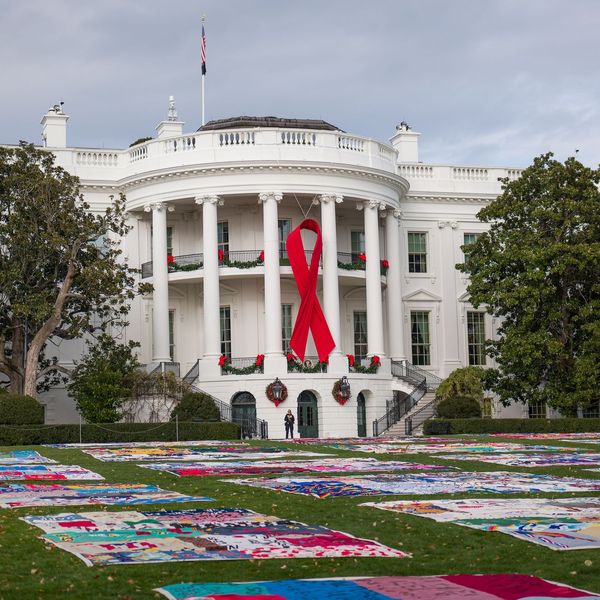Health Experts Applaud New Guidelines for Global HIV Treatment
Treatment must 'move out of clinics and into the communities with mobilized, empowered and engaged people living with HIV'
All HIV patients should have immediate access to treatment, the World Health Organization (WHO) declared Wednesday--a historic call that was applauded by medical experts who cautioned that it's now up to global leaders to make accessible treatment a reality.
Doctors Without Borders/Medecins Sans Frontieres (MSF), which welcomed the new guidelines, said donors and governments would have to dramatically increase their support of treatment programs to ensure that all 37 million HIV patients worldwide are given access to antiretroviral therapy (ART).
"Test and treat can turn the tide on HIV, but in [order] to work as a tool to control the epidemic it will require drastic changes and greatly increased investment," said Dr. Tom Ellman, director of MSF's Southern Africa Medical Unit. "HIV care has to move out of clinics and into the communities with mobilized, empowered and engaged people living with HIV that actually are part of the response. This will need effort and money."
WHO made its recommendation following recent clinical trials that showed early ART extends the lives of individuals living with HIV and reduces the risk of transmission.
The organization said its new guidelines are the start of a push to eradicate AIDS by 2030--a lofty goal which was agreed to by world leaders at last week's United Nations Sustainable Development conference.
Those same leaders "are going to need to show that they're serious" about making the disease history within 15 years, Ellman said Wednesday. "Nobody's going to end AIDS with business as usual."
The WHO's previous guidelines only recommended ART for patients whose CD4 count--found in immune cells--had fallen below a particular level, which restricted access to therapy for 28 million people worldwide.
"We are at a crossroads in the response to AIDS," said Michael Sidibe, executive director of UNAIDS, which helped WHO craft its new guidelines. "We know what works--now we need to put people first and fully respect their right to health."
"These new guidelines and recommendations are a highly significant moment in the AIDS response," Sidibe said. "The medicines and scientific tools now at our disposal provide us with a real opportunity to save millions of lives over the coming years and to end the AIDS epidemic by 2030."
MSF said the "treat all" approach would help ensure that people in developing countries would not fall through the cracks of the worldwide treatment system. In the past decade, one-third of people who were diagnosed with HIV but were ineligible for treatment never returned to health clinics, the health nonprofit said.
"In order to reach as many people as possible, as soon as possible, simplified models of care and self-management strategies are needed that allow people to take more control over their own treatment and care," said Dr. Marc Biot, MSF's operational coordinator for HIV.
"It's no longer only a question of when to start people on treatment, but also how to help people stay on treatment for life and to maintain 'undetectable' levels of virus in their blood. We need to make sure HIV treatment fits into people's lives better, just like with any other chronic disease in industrialized countries," Biot said.
An Urgent Message From Our Co-Founder
Dear Common Dreams reader, The U.S. is on a fast track to authoritarianism like nothing I've ever seen. Meanwhile, corporate news outlets are utterly capitulating to Trump, twisting their coverage to avoid drawing his ire while lining up to stuff cash in his pockets. That's why I believe that Common Dreams is doing the best and most consequential reporting that we've ever done. Our small but mighty team is a progressive reporting powerhouse, covering the news every day that the corporate media never will. Our mission has always been simple: To inform. To inspire. And to ignite change for the common good. Now here's the key piece that I want all our readers to understand: None of this would be possible without your financial support. That's not just some fundraising cliche. It's the absolute and literal truth. We don't accept corporate advertising and never will. We don't have a paywall because we don't think people should be blocked from critical news based on their ability to pay. Everything we do is funded by the donations of readers like you. Will you donate now to help power the nonprofit, independent reporting of Common Dreams? Thank you for being a vital member of our community. Together, we can keep independent journalism alive when it’s needed most. - Craig Brown, Co-founder |
All HIV patients should have immediate access to treatment, the World Health Organization (WHO) declared Wednesday--a historic call that was applauded by medical experts who cautioned that it's now up to global leaders to make accessible treatment a reality.
Doctors Without Borders/Medecins Sans Frontieres (MSF), which welcomed the new guidelines, said donors and governments would have to dramatically increase their support of treatment programs to ensure that all 37 million HIV patients worldwide are given access to antiretroviral therapy (ART).
"Test and treat can turn the tide on HIV, but in [order] to work as a tool to control the epidemic it will require drastic changes and greatly increased investment," said Dr. Tom Ellman, director of MSF's Southern Africa Medical Unit. "HIV care has to move out of clinics and into the communities with mobilized, empowered and engaged people living with HIV that actually are part of the response. This will need effort and money."
WHO made its recommendation following recent clinical trials that showed early ART extends the lives of individuals living with HIV and reduces the risk of transmission.
The organization said its new guidelines are the start of a push to eradicate AIDS by 2030--a lofty goal which was agreed to by world leaders at last week's United Nations Sustainable Development conference.
Those same leaders "are going to need to show that they're serious" about making the disease history within 15 years, Ellman said Wednesday. "Nobody's going to end AIDS with business as usual."
The WHO's previous guidelines only recommended ART for patients whose CD4 count--found in immune cells--had fallen below a particular level, which restricted access to therapy for 28 million people worldwide.
"We are at a crossroads in the response to AIDS," said Michael Sidibe, executive director of UNAIDS, which helped WHO craft its new guidelines. "We know what works--now we need to put people first and fully respect their right to health."
"These new guidelines and recommendations are a highly significant moment in the AIDS response," Sidibe said. "The medicines and scientific tools now at our disposal provide us with a real opportunity to save millions of lives over the coming years and to end the AIDS epidemic by 2030."
MSF said the "treat all" approach would help ensure that people in developing countries would not fall through the cracks of the worldwide treatment system. In the past decade, one-third of people who were diagnosed with HIV but were ineligible for treatment never returned to health clinics, the health nonprofit said.
"In order to reach as many people as possible, as soon as possible, simplified models of care and self-management strategies are needed that allow people to take more control over their own treatment and care," said Dr. Marc Biot, MSF's operational coordinator for HIV.
"It's no longer only a question of when to start people on treatment, but also how to help people stay on treatment for life and to maintain 'undetectable' levels of virus in their blood. We need to make sure HIV treatment fits into people's lives better, just like with any other chronic disease in industrialized countries," Biot said.
All HIV patients should have immediate access to treatment, the World Health Organization (WHO) declared Wednesday--a historic call that was applauded by medical experts who cautioned that it's now up to global leaders to make accessible treatment a reality.
Doctors Without Borders/Medecins Sans Frontieres (MSF), which welcomed the new guidelines, said donors and governments would have to dramatically increase their support of treatment programs to ensure that all 37 million HIV patients worldwide are given access to antiretroviral therapy (ART).
"Test and treat can turn the tide on HIV, but in [order] to work as a tool to control the epidemic it will require drastic changes and greatly increased investment," said Dr. Tom Ellman, director of MSF's Southern Africa Medical Unit. "HIV care has to move out of clinics and into the communities with mobilized, empowered and engaged people living with HIV that actually are part of the response. This will need effort and money."
WHO made its recommendation following recent clinical trials that showed early ART extends the lives of individuals living with HIV and reduces the risk of transmission.
The organization said its new guidelines are the start of a push to eradicate AIDS by 2030--a lofty goal which was agreed to by world leaders at last week's United Nations Sustainable Development conference.
Those same leaders "are going to need to show that they're serious" about making the disease history within 15 years, Ellman said Wednesday. "Nobody's going to end AIDS with business as usual."
The WHO's previous guidelines only recommended ART for patients whose CD4 count--found in immune cells--had fallen below a particular level, which restricted access to therapy for 28 million people worldwide.
"We are at a crossroads in the response to AIDS," said Michael Sidibe, executive director of UNAIDS, which helped WHO craft its new guidelines. "We know what works--now we need to put people first and fully respect their right to health."
"These new guidelines and recommendations are a highly significant moment in the AIDS response," Sidibe said. "The medicines and scientific tools now at our disposal provide us with a real opportunity to save millions of lives over the coming years and to end the AIDS epidemic by 2030."
MSF said the "treat all" approach would help ensure that people in developing countries would not fall through the cracks of the worldwide treatment system. In the past decade, one-third of people who were diagnosed with HIV but were ineligible for treatment never returned to health clinics, the health nonprofit said.
"In order to reach as many people as possible, as soon as possible, simplified models of care and self-management strategies are needed that allow people to take more control over their own treatment and care," said Dr. Marc Biot, MSF's operational coordinator for HIV.
"It's no longer only a question of when to start people on treatment, but also how to help people stay on treatment for life and to maintain 'undetectable' levels of virus in their blood. We need to make sure HIV treatment fits into people's lives better, just like with any other chronic disease in industrialized countries," Biot said.

